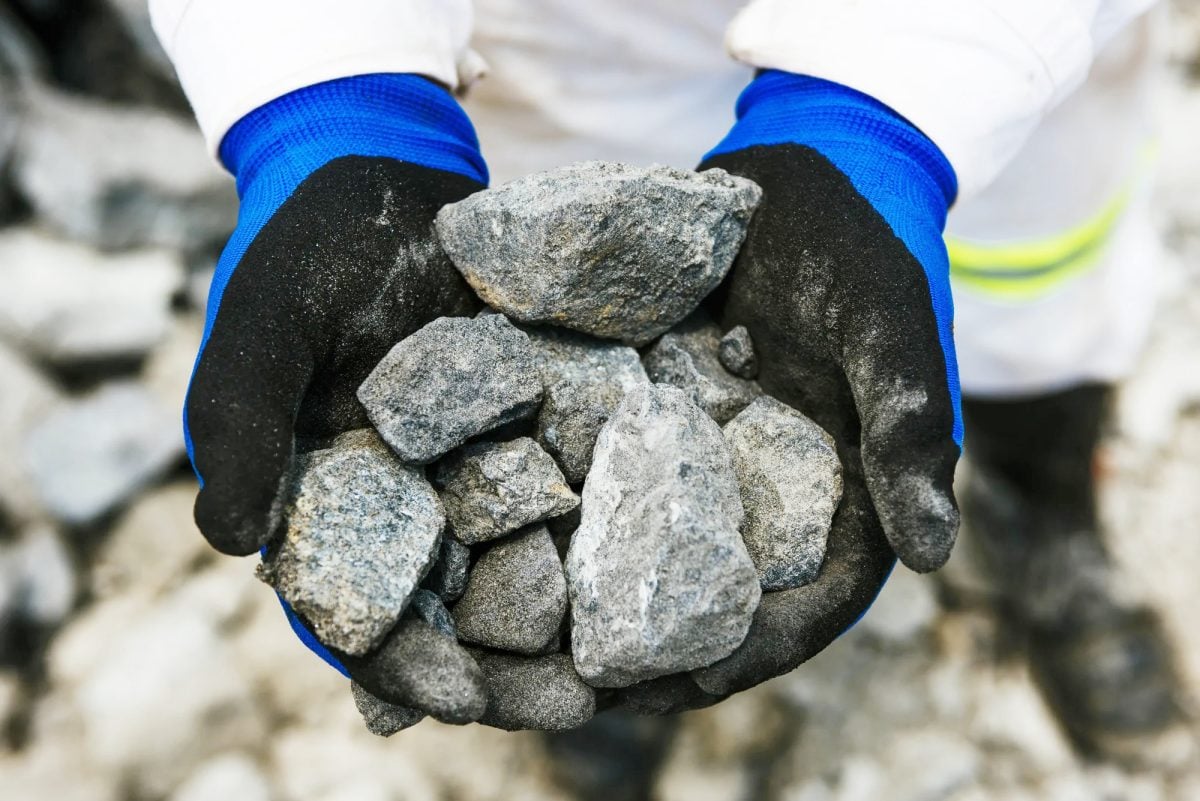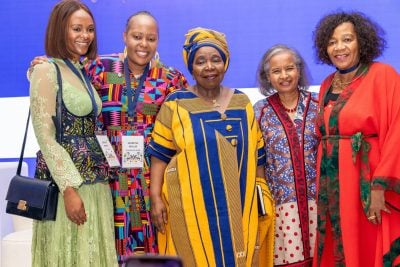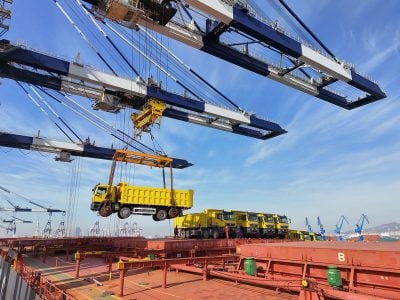Africa holds roughly 30% of the world’s green-transition minerals, which include metals like cobalt, lithium, platinum, and copper. Yet by exporting them largely unprocessed, the continent forfeits the opportunity to integrate more deeply into the global supply chains powering green technologies — solar panels, wind turbines, electric vehicles, hydrogen systems, and battery storage. Boosting local processing and capturing more value at home was a major focus of deliberations at the B20 meetings in Johannesburg.
Kgosientso Ramokgopa, South Africa’s electricity and energy minister, told delegates that Africa must take greater strategic control of its “natural advantages” in critical minerals to drive the energy transition on its own terms.
“We have everything that is required for us to be able to support the decarbonisation agenda,” he said during a fireside chat. “We have significant mineral endowments, significant renewable energy endowment with regard to solar and wind potential along the coastlines, and significant amounts of real estate in terms of uninhabited land with no other competing economic activities.”
Ramokgopa pointed to inadequate energy supply and weak infrastructure as key obstacles to local value addition, adding that skills shortages also posed a considerable challenge.“You need electricity, you need water for you to be able to mine these minerals. And also to beneficiate you are going to need high end skills for you to achieve that level of ambition,” he said.
Ramp up private investment
He appealed to the private sector to co‑invest in projects while urging policymakers to provide the policy and regulatory clarity needed to instill confidence.“There are huge opportunities provided we can orchestrate policies and interventions working with the private sector..
“The kind of capital required to support this endeavour sits with the private sector. There are great levels of alignment (on this)at least in South Africa and also when I talk with my counterparts on the continent. I think we are moving in the right direction,” he added.
Simon Baloyi, President and CEO Sasol Limited, who joined the minister on the fireside chat, argued that Africa needs massive investments not only in power generation, but increasingly also in transmission. “The first infrastructure that is urgent is transmission infrastructure,” he said. “Value addition is only 5 -10% (of total mineral exports) because there is no access to energy.”
He affirmed the need for deeper private sector collaboration with governments on energy projects, stressing that engagement must also extend to the communities – they must also be part of the equation. “We should step back and ask why we want to do this? It’s for people. We still have 600m Africans without electricity. As a person who grew up without electricity I know what that is. It’s challenging,” he said.
Turning to energy generation, Baloyi emphasised that Africa must strive for an energy mix that reflects its development ambitions and natural endowments. He argued that while renewable energy is vital, it should be deployed strategically alongside other sources.
“As we advance renewable energy we also need to be cognisant of the other energy forms that you need, cause you need a mix in order to have a baseload. So looking like energy sources like gas, you will have to think in terms of nuclear – we now have small modular reactors. ,
“The goal, he noted, is to make sure that “energy is reliable, is always available, and cheap, cause when it is cheap it does give you a competitive advantage to move further (higher up) in the value chain.”
South Africa’s transition gains pace
Ramokgopa insisted that a just transition begins at home, arguing that governments’ commitments to their citizenry must take precedence over international demands.“We do appreciate that we have got an obligation first to our people before we satisfy international obligations,” he said.
“The starting point is that the transition must be at a pace and scale that we can afford. There are things that we know have worked over time. We have been able to industrialise on the back of fossil fuels. Coal is a big part of the backbone of energy generation in the country and it is also a baseload,” he noted.
While acknowledging coal’s continuing role as a cornerstone of South Africa’s energy system, he noted that renewables are expanding rapidly as a share of the overall mix.
“Nuclear is a big part of the energy mix. The only 2 active reactors on the continent are here in South Africa,” he said.
“In 2010 we decided that there is a need for us to build a pipeline of renewable energy projects. That is why now we have the biggest installed capacity of renewable energy of any country on the continent,” he noted, stressing that the country was accelerating the pace of expansion even further.
“As I speak coal represents about 80% of disbursed electricity. Our projection is by 2039 coal will be 27%, wind about 35% and PV about 27%. So you can see that we are pivoting but of course coal remains the backbone.”
Strengthen grassroots exploration
In a panel that followed, Catherine Raw, BHP’s Chief Development Officer, stressed the importance of strengthening grassroots exploration to grow mining in Africa from the bottom up. She argued that robust grassroots exploration helps build a pipeline of viable deposits while boosting the local industry’s capacity to integrate into global value chains.
“At BHP we have the ‘explore programme’ which is now in its fourth cohort. It’s an annual mining accelerator programme – based upon the Silicon Valley type incubator programmes – that really looks at, how do you support and grow that grassroots exploration ecosystem,” she said.
She noted that BHP provides free funding alongside technical, commercial and geological support and expertise. In return, the company gets data on prospective opportunities.
“The win for us is we get the data. Being able to look at that geoscience data and use AI for it. The other element of that exploration ecosystem is about identifying opportunities, being able to partner with those companies, and ultimately eventually discover, acquire and develop those deposits that will lead to a strong future for Africa,” Raw said.
Ending commodity overdependence
Yusuf Daya, Afreximbank’s director for AU/AfCFTA Relations and Trade Policy, highlighted the crucial role of African development finance institutions (DFI) in promoting value addition for critical minerals. “African financial institutions have the benefit of deploying foreign capital as well as local capital to unlock these opportunities and ensure that we drive an African-led development agenda. One that serves the needs of the continent,” he said.
“We (Afreximbank) realized that Africa remains commodity dependent. Of the 55 African countries, 6 depend on oil and gas for over 70% of export of revenues, another 22 depend on a single non-fuel primary commodity for over 50% of their export, and 34 countries depend on up to three primary commodities for at least half of their export earnings,” he elaborated.
“The impact is that we remain price takers, we remain exposed to global volatility…we export our wealth and our jobs and we import finished goods. We remain trapped in commodity boom and bust cycles determined by the global economy,” he added.
Daya said that Afreximbank was focused on supporting local value addition of critical minerals, in line with its strategic plan to accelerate industrialisation and export development. “We have to make sure we move up the value chain. In his investiture ceremony our president (George Elombi) said ‘we will not be looking at raw commodities any more. Come to us and we want to support processing and value addition’”
The case for clustered industrial zones
Clustered industrial zones are Africa’s best shot at boosting local value addition of its critical minerals, argued Agit Singh, executive head of processing operations, Valterra Platinum. By grouping mines to share infrastructure, services and supply chains, he said, operators can slash costs and gain scale.
One of the advantages of clusters, he noted, is coordinated materials supply. “If you look at the raw materials that actually go into making and processing in Africa or in the world, there are a couple of really high input materials that are required. For example steel bolts are a massive input into the mining industry. Tires, diesel, and the list goes on. In the processing plants, chemicals are extremely important.”
“We believe that by leveraging clusters you are able to create essential distribution that allows economies of scale, driving costs down. That creates security for the mining companies, but at the same time it also creates security for the suppliers, so it’s a win-win for everyone,” he added.
 Sign in with Google
Sign in with Google 



